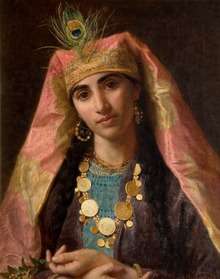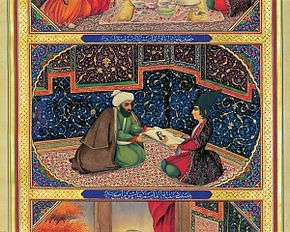Scheherazade
| Scheherazade شهرزاد | |
|---|---|
| One Thousand and One Nights character | |
 Scheherazade, painted in the 19th century by Sophie Anderson | |
| Portrayed by | Mili Avital, Catherine Zeta-Jones, Claude Jade, Anna Karina, María Montez, Cyrine Abdelnour, Sulaf Fawakherji |
| Information | |
| Gender | Female |
| Occupation | Queen consort |
| Family |
The chief vizier (father) Dunyazad (sister) |
| Spouse(s) | Shahryar |
| Children | 3 sons |
| Other names | Shahrazad, Shahrzad |
Scheherazade /ʃəˌhɛrəˈzɑːd,
Name
According to modern scholarship, the name Scheherazade derives from the Middle Persian name Čehrāzād, which is composed of the words čehr (lineage) and āzād (noble, exalted).[1][2]
The earliest forms of Scheherazade's name in Arabic sources include Shirazad (شيرازاد Šīrāzād) in Masudi, and Shahrazad (شهرازاد Šahrāzād) in Ibn al-Nadim, the latter meaning in New Persian "the person whose realm/dominion (شهر šahr) is free (آزاد āzād)". It is shortened as "Shahrzad" (شهرزاد Šahrzād/Šarzād) in modern Persian.
Narration

The story goes that the monarch Shahryar (شهریار Šahryār, from Middle Persian šahr-dār, "holder of the realm")[1] found out one day that his first wife was unfaithful to him. Therefore, he resolved to marry a new virgin each day as well as behead the previous day's wife, so that she would have no chance to be unfaithful to him. He had killed 1,001 such women by the time he was introduced to Scheherazade, the vizier's daughter.
In Sir Richard Burton's translation of The Nights, Scheherazade was described in this way:
Scheherazade had perused the books, annals and legends of preceding Kings, and the stories, examples and instances of bygone men and things; indeed it was said that she had collected a thousand books of histories relating to antique races and departed rulers. She had perused the works of the poets and knew them by heart; she had studied philosophy and the sciences, arts and accomplishments; and she was pleasant and polite, wise and witty, well read and well bred.
Against her father's wishes, Scheherazade volunteered to spend one night with the king. Once in the king's chambers, Scheherazade asked if she might bid one last farewell to her beloved sister, Dunyazade (دنیازاد Donyāzād), who had secretly been prepared to ask Scheherazade to tell a story during the long night. The king lay awake and listened with awe as Scheherazade told her first story. The night passed by and Scheherazade stopped in the middle. The king asked her to finish, but Scheherazade said there was no time, as dawn was breaking. So, the king spared her life for one day to finish the story the next night. The following night, Scheherazade finished the story and then began a second, even more exciting tale, which she again stopped halfway through at dawn. Again, the king spared her life for one more day so she could finish the second story.
And so the king kept Scheherazade alive day by day, as he eagerly anticipated the finishing of the previous night's story. At the end of 1,001 nights, and 1,000 stories, Scheherazade told the king that she had no more tales to tell him. During these 1,001 nights, the king had fallen in love with Scheherazade. He spared her life, and made her his queen.
See also
References
- 1 2 Ch. Pellat (2011). "ALF LAYLA WA LAYLA". Encyclopædia Iranica.
- ↑ Hamori, A. (2012). "S̲h̲ahrazād". In P. Bearman, Th. Bianquis, C.E. Bosworth, E. van Donzel, W.P. Heinrichs. Encyclopaedia of Islam (2nd ed.). Brill. (Subscription required (help)).
External links
| Wikiquote has quotations related to: Scheherazade |
| Wikimedia Commons has media related to Scheherazade. |